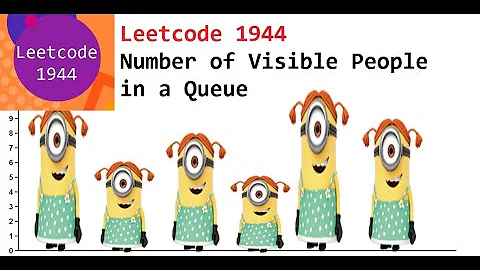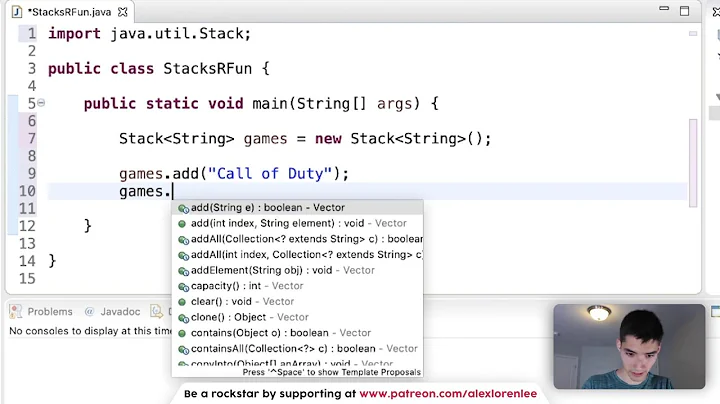Size-limited queue that holds last N elements in Java
Solution 1
Apache commons collections 4 has a CircularFifoQueue<> which is what you are looking for. Quoting the javadoc:
CircularFifoQueue is a first-in first-out queue with a fixed size that replaces its oldest element if full.
import java.util.Queue;
import org.apache.commons.collections4.queue.CircularFifoQueue;
Queue<Integer> fifo = new CircularFifoQueue<Integer>(2);
fifo.add(1);
fifo.add(2);
fifo.add(3);
System.out.println(fifo);
// Observe the result:
// [2, 3]
If you are using an older version of the Apache commons collections (3.x), you can use the CircularFifoBuffer which is basically the same thing without generics.
Update: updated answer following release of commons collections version 4 that supports generics.
Solution 2
Guava now has an EvictingQueue, a non-blocking queue which automatically evicts elements from the head of the queue when attempting to add new elements onto the queue and it is full.
import java.util.Queue;
import com.google.common.collect.EvictingQueue;
Queue<Integer> fifo = EvictingQueue.create(2);
fifo.add(1);
fifo.add(2);
fifo.add(3);
System.out.println(fifo);
// Observe the result:
// [2, 3]
Solution 3
I like @FractalizeR solution. But I would in addition keep and return the value from super.add(o)!
public class LimitedQueue<E> extends LinkedList<E> {
private int limit;
public LimitedQueue(int limit) {
this.limit = limit;
}
@Override
public boolean add(E o) {
boolean added = super.add(o);
while (added && size() > limit) {
super.remove();
}
return added;
}
}
Solution 4
Use composition not extends (yes I mean extends, as in a reference to the extends keyword in java and yes this is inheritance). Composition is superier because it completely shields your implementation, allowing you to change the implementation without impacting the users of your class.
I recommend trying something like this (I'm typing directly into this window, so buyer beware of syntax errors):
public LimitedSizeQueue implements Queue
{
private int maxSize;
private LinkedList storageArea;
public LimitedSizeQueue(final int maxSize)
{
this.maxSize = maxSize;
storageArea = new LinkedList();
}
public boolean offer(ElementType element)
{
if (storageArea.size() < maxSize)
{
storageArea.addFirst(element);
}
else
{
... remove last element;
storageArea.addFirst(element);
}
}
... the rest of this class
A better option (based on the answer by Asaf) might be to wrap the Apache Collections CircularFifoBuffer with a generic class. For example:
public LimitedSizeQueue<ElementType> implements Queue<ElementType>
{
private int maxSize;
private CircularFifoBuffer storageArea;
public LimitedSizeQueue(final int maxSize)
{
if (maxSize > 0)
{
this.maxSize = maxSize;
storateArea = new CircularFifoBuffer(maxSize);
}
else
{
throw new IllegalArgumentException("blah blah blah");
}
}
... implement the Queue interface using the CircularFifoBuffer class
}Solution 5
The only thing I know that has limited space is the BlockingQueue interface (which is e.g. implemented by the ArrayBlockingQueue class) - but they do not remove the first element if filled, but instead block the put operation until space is free (removed by other thread).
To my knowledge your trivial implementation is the easiest way to get such an behaviour.
Related videos on Youtube
GreyCat
Updated on November 24, 2020Comments
-
GreyCat over 3 years
A very simple & quick question on Java libraries: is there a ready-made class that implements a
Queuewith a fixed maximum size - i.e. it always allows addition of elements, but it will silently remove head elements to accomodate space for newly added elements.Of course, it's trivial to implement it manually:
import java.util.LinkedList; public class LimitedQueue<E> extends LinkedList<E> { private int limit; public LimitedQueue(int limit) { this.limit = limit; } @Override public boolean add(E o) { super.add(o); while (size() > limit) { super.remove(); } return true; } }As far as I see, there's no standard implementation in Java stdlibs, but may be there's one in Apache Commons or something like that?
-
andersoj about 13 years
-
Nicolas Bousquet about 13 yearsPersonnaly I would not introduce another library if this would the only use of this library...
-
Renaud over 11 years@Override public boolean add(PropagationTask t) { boolean added = super.add(t); while (added && size() > limit) { super.remove(); } return added; }
-
 Aliaksandr Arashkevich almost 10 yearsBe careful using the above code! We are getting java.util.NoSuchElementException when using this in multiple threads!
Aliaksandr Arashkevich almost 10 yearsBe careful using the above code! We are getting java.util.NoSuchElementException when using this in multiple threads! -
 Diego over 9 yearsWarning: the code in question, although it apparently works, it could backfire. There are additional methods that can add more elements to the queue (such as addAll()) that ignore this size check. For more details see Effective Java 2nd Edition - Item 16: Favor composition over inheritance
Diego over 9 yearsWarning: the code in question, although it apparently works, it could backfire. There are additional methods that can add more elements to the queue (such as addAll()) that ignore this size check. For more details see Effective Java 2nd Edition - Item 16: Favor composition over inheritance -
toongeorges almost 4 yearsyou could also take a look at docs.oracle.com/en/java/javase/11/docs/api/java.base/java/util/…
-
-
GreyCat about 13 yearsI've already browsed through Java stdlib classes, and, sadly,
BlockingQueueis not an answer. I've thought of other common libraries, such as Apache Commons, Eclipse's libraries, Spring's, Google's additions, etc? -
kdgregory about 13 yearsDo you understand what a priority queue is, and how it differs from the OP's example?
-
moritz about 13 yearsSure, i just say u can use the MinMaxPriorityQueue, u must not care about the Priority part since there is no MinMaxQueue in the guava libs.
-
 Mark Peters about 13 years@kdgregory: It can be used with some extra work. Just keep an
Mark Peters about 13 years@kdgregory: It can be used with some extra work. Just keep anlong cursor = Long.MAX_VALUE, use it as the priority value and decrement it each time you add to the queue. In practice that will almost certainly be sufficient. -
kdgregory about 13 years@Mark Peters - I just don't know what to say. Sure, you can make a priority queue behave like a fifo queue. You could also make a
Mapbehave like aList. But both ideas show a complete incomprehension of algorithms and software design. -
 Mark Peters about 13 years@kdgregory: The question wasn't about a good way to implement a circular buffer, the question was about how close the common Java collections libraries could get to providing a circular buffer. This gets pretty close. I agree that it isn't a nice solution.
Mark Peters about 13 years@kdgregory: The question wasn't about a good way to implement a circular buffer, the question was about how close the common Java collections libraries could get to providing a circular buffer. This gets pretty close. I agree that it isn't a nice solution. -
jtahlborn about 13 years@Mark Peters - isn't every question on SO about a good way to do something?
-
 Mark Peters about 13 years@jtahlborn: Clearly not (code golf), but even if they were, good is not a black and white criterion. For a certain project, good might mean "most efficient", for another it might mean "easiest to maintain" and for yet another, it might mean "least amount of code with existing libraries". All that is irrelevant since I never said this was a good answer. I just said it can be a solution without too much effort. Turning a
Mark Peters about 13 years@jtahlborn: Clearly not (code golf), but even if they were, good is not a black and white criterion. For a certain project, good might mean "most efficient", for another it might mean "easiest to maintain" and for yet another, it might mean "least amount of code with existing libraries". All that is irrelevant since I never said this was a good answer. I just said it can be a solution without too much effort. Turning aMinMaxPriorityQueueinto what the OP wants is more trivial than modifying aLinkedList(the OP's code doesn't even come close). -
kdgregory about 13 years@Mark - how does the OP's code not even come close? And I'll ask you the same question that I asked this poster: do you understand how a priority queue differs from a fifo queue? Or to be more blunt: do you understand that modifying a priority queue gives you O(logN) performance versus O(1)?
-
kdgregory about 13 years+1 if you explain why composition is a better choice (other than "prefer composition over inheritance) ... and there is a very good reason
-
 Mark Peters about 13 years@kdgregory: I understand perfectly well, thank you. And as I've said multiple times, I don't think this is a good solution, just that it has the potential to be a solution. The OP's code doesn't come close because there are still about a dozen ways to circumvent the maximum size invariant. Anyway wasn't trying to kick off a huge debate here or to argue that it's a good answer, just that there is a way to turn this data type into a fifo queue.
Mark Peters about 13 years@kdgregory: I understand perfectly well, thank you. And as I've said multiple times, I don't think this is a good solution, just that it has the potential to be a solution. The OP's code doesn't come close because there are still about a dozen ways to circumvent the maximum size invariant. Anyway wasn't trying to kick off a huge debate here or to argue that it's a good answer, just that there is a way to turn this data type into a fifo queue. -
 Mark Peters about 13 yearsMaybe you guys are examining my choice of words "in practice that will almost certainly be sufficient". I didn't mean that this solution would almost certainly be sufficient for the OP's problem or in general. I was referring to the choice of a descending
Mark Peters about 13 yearsMaybe you guys are examining my choice of words "in practice that will almost certainly be sufficient". I didn't mean that this solution would almost certainly be sufficient for the OP's problem or in general. I was referring to the choice of a descendinglongas a cursor type within my own suggestion, saying that it would be sufficiently wide in practice even though theoretically you could add more than 2^64 objects to this queue at which point the solution would break down. -
GreyCat about 13 yearsComposition is a poor choice for my task here: it means at least twice the number of objects => at least twice more often garbage collection. I use large quantities (tens of millions) of these limited-size queues, like that: Map<Long, LimitedSizeQueue<String>>.
-
kdgregory about 13 years@GreyCat - I take it you haven't looked at how
LinkedListis implemented, then. The extra object created as a wrapper around the list will be pretty minor, even with "tens of millions" of instances. -
kdgregory about 13 yearsI was going for "reduces the size of the interface," but "shields the implementation" is pretty much the same thing. Either answers Mark Peter's complaints about the OP's approach.
-
GreyCat over 12 yearsI don't really understand how to adapt LRUMap to act as a queue and I guess it would be rather hard to use even if it's possible.
-
GreyCat over 11 yearsAs far as I can see, FractalizeR hasn't provided any solution, only edited the question. "Solution" within the question is not a solution, because the question was about using some class in standard or semi-standard library, not rolling your own.
-
Tom Carchrae almost 11 yearsHere is the source: code.google.com/p/guava-libraries/source/browse/guava/src/com/… - it looks like it would be easy to copy and compile with current releases of Guava
-
GreyCat over 10 yearsThe question was about classes in popular collection class libraries, not rolling one's own - minimalistic homebrew "solution" was already provided in question.
-
user590444 over 10 yearsthat does not matter google find this page also on another queries =)
-
 Basil Bourque about 10 yearsSee this other answer for link to
Basil Bourque about 10 yearsSee this other answer for link toEvictingQueueadded to Google Guava version 15 around 2013-10. -
 Basil Bourque about 10 yearsUpdate: This class was officially released with Google Guava in version 15, around 2013-10.
Basil Bourque about 10 yearsUpdate: This class was officially released with Google Guava in version 15, around 2013-10. -
kostmo over 9 years@MaciejMiklas The question asks for a FIFO,
EvictingQueueis a FIFO. In case there is any doubt, try this program:Queue<Integer> fifo = EvictingQueue.create(2); fifo.add(1); fifo.add(2); fifo.add(3); System.out.println(fifo);Observe the result:[2, 3] -
 Konrad Morawski over 8 yearsIt should be pointed out that this solution is not thread-safe
Konrad Morawski over 8 yearsIt should be pointed out that this solution is not thread-safe -
Renaud over 8 years@KonradMorawski the whole LinkedList class is not thread-safe anyway, so your comment is pointless in this context!
-
 Konrad Morawski over 8 years@RenaudBlue thread safety is a valid concern (if often overlooked), so I don't think the comment is pointless. and reminding that
Konrad Morawski over 8 years@RenaudBlue thread safety is a valid concern (if often overlooked), so I don't think the comment is pointless. and reminding thatLinkedListisn't thread safe wouldn't be pointless either. in the context of this question, OP's specific requirement makes it particularly important that adding an item is performed as an atomic operation. in other words, the risk of not ensuring atomicity would be greater than in case of a regular LinkedList. -
Michael Böckling over 8 yearsThis is now the correct answer. Its a bit unclear from the documentation, but EvictingQueue is a FIFO.
-
ed22 almost 8 yearsIs there any callback called when element is evicted from the queue?
-
ed22 almost 8 yearsIs there any callback called when element is evicted from the queue due to addition to full queue?
-
lmo almost 8 yearsThis answer turned up in the low quality review queue, presumably because you don't provide any explanation of the code. If this code answers the question, consider adding adding some text explaining the code in your answer. This way, you are far more likely to get more upvotes — and help the questioner learn something new.
-
 simpleuser almost 7 yearsa "Circular Queue" is merely one implementation which satisfies the question. But the question does not directly benefit from a circular queue's main differences, i.e. not having to free/reallocate each bucket at each addition/deletion.
simpleuser almost 7 yearsa "Circular Queue" is merely one implementation which satisfies the question. But the question does not directly benefit from a circular queue's main differences, i.e. not having to free/reallocate each bucket at each addition/deletion. -
 Holger over 6 yearsBreaks as soon as someone calls
Holger over 6 yearsBreaks as soon as someone callsadd(int,E)instead. And whetheraddAllworks as intended, depends on unspecified implementation details. That’s why you should prefer delegation over inheritance… -
Swapnil about 6 years@Asaf Is there any similar in STL or Booost?
-
Asaf almost 6 years@Swapnil take a look here: boost.org/doc/libs/1_67_0/doc/html/circular_buffer.html
-
 Vsevolod Golovanov about 4 yearsIt's also still officially marked as
Vsevolod Golovanov about 4 yearsIt's also still officially marked as@Beta, as is Guava's tradition. -
kai over 2 yearshere's the maven dependency: mvnrepository.com/artifact/org.apache.commons/…








![Cấu trúc dữ liệu & Giải thuật [13]: Stack And Queue | Ngăn xếp và Hàng đợi](https://i.ytimg.com/vi/Fx1l2jOKbJE/hq720.jpg?sqp=-oaymwEcCNAFEJQDSFXyq4qpAw4IARUAAIhCGAFwAcABBg==&rs=AOn4CLBmPE9wYabYcZBI39Hx5pEfTQc3MQ)

